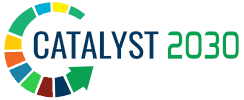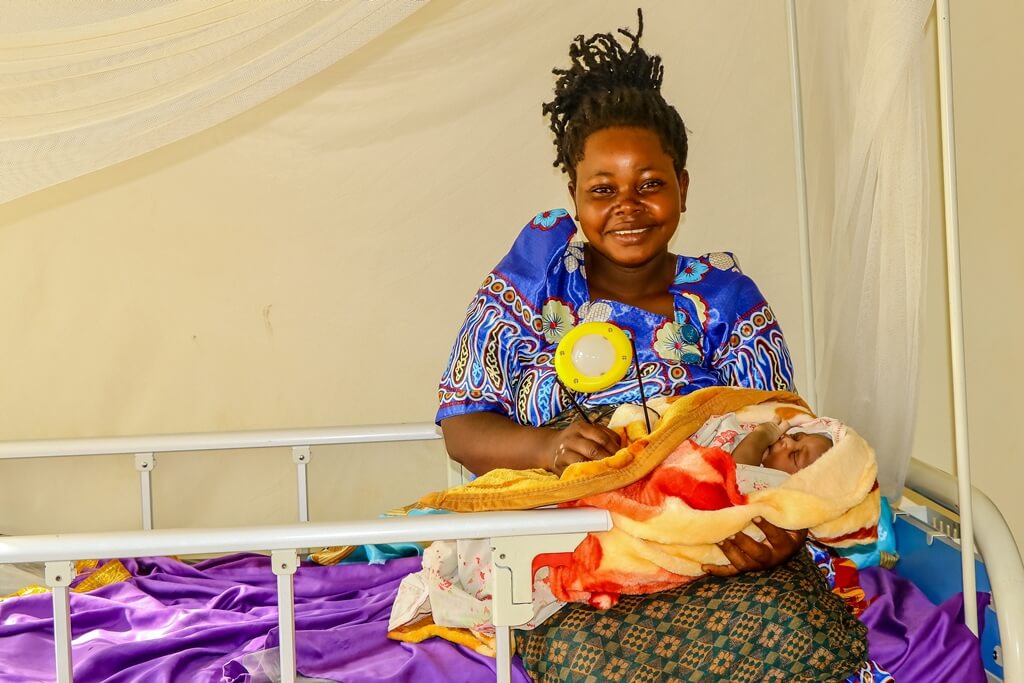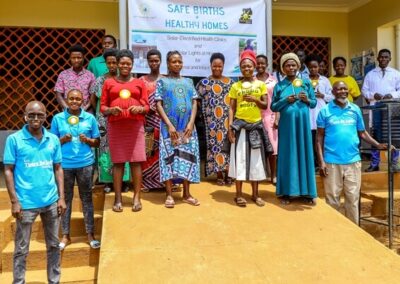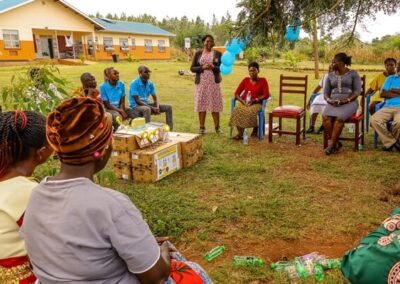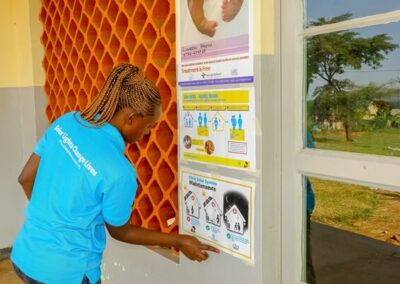First new mother to receive a solar light upon launch of Safe Births + Healthy Homes program
Maternal and infant health
The collaboration, Safe Births + Healthy Homes, was forged in 2019 to prevent the lack of electricity from continuing to compromise maternal and infant health during birthing. At the time a District Health Officer (DHO) in the Kyankwanzi District of Uganda approached a midwife working with Let There Be Light International (LTBLI) and Solar Health Uganda to collaborate to address maternal and infant health in rural, off-grid Uganda.
Let There Be Light International was already funding the solar-electrification of last-mile health clinics and, in a separate programme, offering pico solar lights to new mothers to help with infant care. Recognising an opportunity for a scalable model, the DHO asked LTBLI to work with their office and a local midwife supported by SHU to co-create a new intervention, Safe Births + Healthy Homes.
The programme includes:
- Solar-electrification of off-grid rural health clinics offering maternity services,
- Education outreach tothe community and all stakeholders about the relative benefits of solar lighting over unsafe, nonrenewable biofuels,
- The donation of a safe solar (pico) light to all mothers who deliver at the participant clinics for infant care at home after the critical birth event.
Eight frontline health clinics have participated in Safe Births + Healthy Homes in Uganda, serving 7,000 mother/baby pairs. This has resulted in improved health and safety of the community, measured through increased attended birth rates, decreased use of kerosene and candles in the homes, improved health and safety outcomes for the family members, and increased malaria-preventing bednets with the elimination of open-flamed lighting inputs.
The collaboration is led by Catalyst 2030 members, Caroline Mwebaza of Solar Health Uganda and Sarah Baird, Let There Be Light International, and includes George Mike Luberenga, also of Solar Health Uganda.
Addressing issues of health, diversity and inclusion and energy, the Safe Births + Healthy Homes Collaboration is ready to scale and is seeking cross-sectoral collaboration, particularly with practitioners, governments and funders to improve maternal and infant health outcomes.
Q and A
Catalyst 2030 is dedicated to supporting collaborative systems change, this means our activities seek to address root causes and shift the conditions that hold a problem in place. Please tell us a bit about how your collaboration is doing this based on what you’ve said above.
The root causes of maternal and infant death are multidimensional. Therefore systems change must embrace transformative projects that prioritise SDGs that are linked.
In Uganda, a range of overlapping factors impact poor maternal and infant health outcomes in off-grid communities. These include entrenched poverty, poor health care access and delivery, a reliance on traditional birth practices, poor indoor and ambient air quality and staffing shortages/turnover at under-resourced frontline health facilities.
These last mile communities also experience energy poverty through lack of access and affordability gaps. Households in rural Uganda spend (on average) 15-30% of their weekly household income on unsafe and non-renewable lighting. Frontline health clinics without electricity also waste limited financial and human resources on securing and purchasing fuel and traveling to charge phones off-site in distant trading centres.
Our collaborative model focuses on scalable systems change that addresses these root causes of poverty and poor health outcomes. There are no simple, scalable policy-based programmes in Uganda (or other energy poor sub-Saharan African countries) that address the maternal health/energy nexus, beyond the electrification of last-mile health clinics. Together, we are building a replicable and scalable evidence-based practice to change this.
Which of the Catalyst 2030 principles are guiding how you design and deliver your collaboration?
We take into account all the principles. Safe Births + Healthy Homes was co-created by local community leaders, health practitioners, a Ugandan NGO, and a US-based funding and programme partner in response to community-identified needs. Access to energy in the clinic and homes was identified as a systems change enabler through the creation of educational, outreach and home-based solutions that work in concert with clinic electrification projects. The “plus” sign in the programme title is intentional. It signifies the colleactive qualities of the community education and home-based components of this transformative project.
All programme modifications are co-led with input and leadership from the local community. Recent examples include the installation of appropriate signage and programme descriptions in local languages that are displayed at all participant clinics.
Programme launches and successes are celebrations open to, and shared with, everyone in the entire catchment area. All Village Health Teams (VHTs) and local leadership are engaged and receive their own pico lights for demonstration and personal use.
We collect and analyse data that is shared widely, as we seek to create systems change in maternal and infant healthcare access and delivery, as well as household health and safety outcomes.
One of our strategic priorities is shifting power dynamics, please tell us about how your collaboration is doing / wants to do this (in how it’s designed, operates, and delivers).
Today, the eight participant clinics and District Health Offices own the systems and participate with SHU in monthly maintenance and impact surveys. Furthermore, the local VHTs and midwives are provided with tablet computers with pre-loaded intake and follow-up surveys which they administer to the participant mothers. All data is disaggregated for gender, geography, disability status, age and other markers. Each survey administrator receives financial compensation for each survey completed. SB+HH participant mothers are given both intake surveys and follow-up surveys at the 10-week vaccination appointment to track programme indicators and outcomes.
Based on what you’ve selected above, please tell us more
Safe Births + Healthy Homes is not rocket science. It is intuitive, easily replicable and creates immediate and lasting impact for mothers and babies. However, the maternal and infant health sector, anti-malarial projects, Health and Energy Ministries and the environmental sector often operate in separate spaces.
Here is an opportunity to scale impact through an integrated and proven programme implemented and supported by local stakeholders. But a resource-constrained volunteer-led nonprofit in the USA does not have the financial wherewithal or capacity to scale this innovative collaborative project. SB+HH needs a champion with broader reach to fund the programme at scale and to influence key stakeholders including funders, health, nergy and environment Ministries, and to build out the capacity of Solar Health Uganda and other partners to continue the evaluation and monitoring components.
